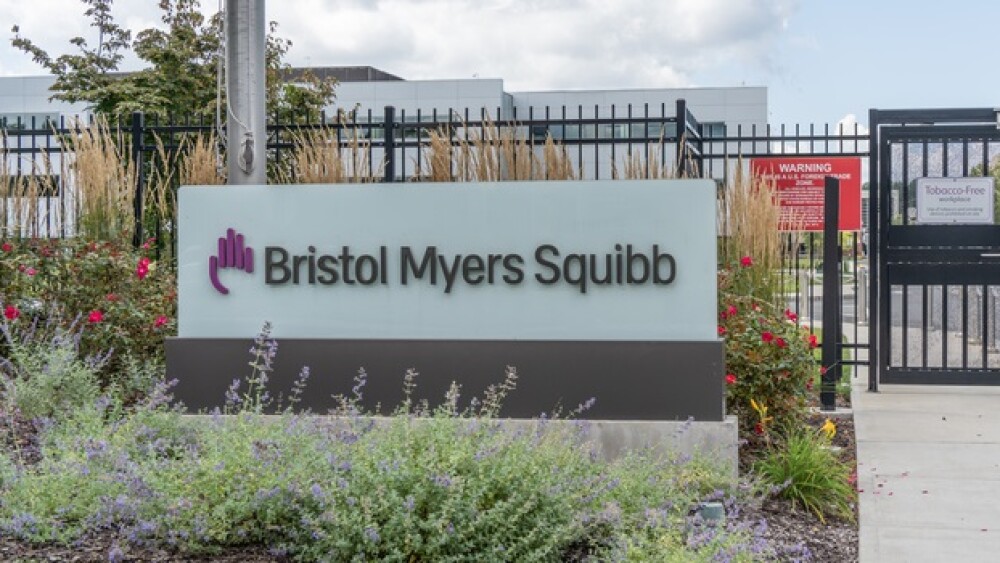Bristol Myers Squibb’s pipeline cuts, announced Thursday during its R&D Day, include a mid-stage drug candidate for nonalcoholic steatohepatitis and an anti-TIGIT solid tumor program.
Pictured: Bristol Myers Squibb in New Jersey/iStock, arlutz73
Bristol Myers Squibb has trimmed its development pipeline, announcing at an R&D Day on Thursday that the company would be cutting two mid-stage and four early-stage clinical programs for efficacy and safety reasons.
Two Phase II clinical programs were on the BMS chopping block, including an investigational asset targeting heat shock protein 47 (HSP47), a small interfering RNA (siRNA) for nonalcoholic steatohepatitis (NASH), which was licensed from Nitto Denko for an upfront payment of $100 million in 2016. The compound inhibits expression of the heat shock protein, which is associated with excessive collagen buildup such as occurs in NASH, which is the most severe form of fatty liver disease.
In 2019, BMS completed a Phase II trial investigating two different doses of the siRNA in 61 patients with scar tissue buildup post-hepatitis C infection. Neither dose performed better than a placebo in inhibiting liver scarring, according to the federal clinical trials database.
BMS’ decision to nix the siRNA comes on the heels of Madrigal Pharmaceuticals’ announcement on Wednesday that its NASH treatment, resmetirom, was approved for priority review by the FDA with a decision expected by March 14, 2024. Company shares jumped over 200% in December after the candidate hit both primary endpoints and a secondary endpoint in a Phase III trial. Madrigal also announced that the FDA is not planning to hold an advisory committee meeting to discuss the application.
Thursday’s announced BMS pipeline cuts also included an anti-TIGIT solid tumor program studying the efficacy of the antibody in non-small cell lung cancer (NSCLC), which is usually less responsive to chemotherapy and radiation therapy than small cell lung cancer, according to the National Cancer Institute. However, the clinical trial had only enrolled one patient before being terminated, with BMS citing “safety reasons, adverse change in the risk/benefit,” according to the federal clinical trials database.
Nonetheless, BMS is still pressing forward with an early stage, bispecific anti-TIGIT it licensed from Agenus in 2021 for $200 million upfront, with another $1.36 billion up for grabs in milestone payments.
However, the technology suffered a significant setback in May 2022 after Roche’s Genentech posted disappointing Phase III results casting doubt over other companies developing their own anti-TIGIT drugs. Then, last month, Genentech provided a short update for its Phase III SKYSCRAPER-01 study, releasing immature but nevertheless promising overall survival data for its anti-TIGIT immunotherapy tiragolumab in patients with locally advanced or metastatic non-small cell lung cancer.
But it’s not all good recent news for the sector. In July 2023, Novartis ended its agreement with BeiGene for option rights to ociperlimab, an anti-TIGIT checkpoint inhibitor, less than two years after the collaboration began. The Swiss pharma decided not to proceed with a Phase III study of ociperlimab in NSCLC or a Phase II study of the drug in triple negative breast cancer.
Four early-stage BMS clinical programs also got the axe, according to the company’s Thursday announcement. They included a CD47xCD20 bispecific program, a molecular glue for acute myeloid leukemia, as well as a receptor-protein kinase 1 (RIPK1) inhibitor being investigated as an autoimmune disease treatment.
At the same time, BMS is looking to expand its registrational assets over the next 18 months from six to 12. That includes: a CD19-directed NEX T cell therapy for immunologic diseases, a cell therapy targeting GPRC5G, a potential therapeutic target in multiple myeloma, a BCMA x CD3 T-cell engager going into Phase III trials, a potential first-in-class protein degrader going into a Phase III first-line large B-cell lymphoma, an androgen receptor degrader going into metastatic castration-resistant prostate cancer trials, as well as a potential best-in-class BET inhibitor for myelofibrosis.
The company also cited 25 indication expansion opportunities as well as nine “high-potential early assets expected to advance in the pipeline.” CMO Samit Hirawat said in a statement that BMS’ “integrated approach to R&D will allow us to maximize innovation and get more medicines to more patients faster.”
Connor Lynch is a freelance writer based in Ottawa, Canada. Reach him at lynchjourno@gmail.com.





